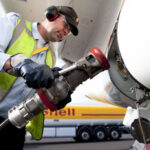The European Parliament has approved the ReFuelEU Aviation regulation that will oblige fuel suppliers to blend increasing levels of sustainable aviation fuels, including synthetic fuels, in jet fuel taken on-board at EU airports. Starting from 2025, at least 2% of aviation fuels will be green, with this share increasing every five years to reach 6% in 2030, 34% in 2040 and 70% in 2050. In addition, a specific proportion of the fuel mix – 1.2% in 2030, 2% in 2032, 5% in 2035 and progressively rising to 35% in 2050 – must comprise synthetic fuels, such as e-kerosene. According to the new rules, the term ‘sustainable aviation fuels’, will include synthetic fuels, certain biofuels produced from agricultural or forestry residues, algae, bio-waste, used cooking oil or certain animal fats, and recycled fuels produced from waste gases and waste plastic. The adoption of the regulation by MEPs has been welcomed by representatives of the European aviation industry.
The new rules were adopted by 518 votes in favour, 97 against and eight abstentions, and once approved by EU member states through the European Council, will apply as of 1 January 2024 and some provisions as of 1 January 2025.
The ReFuelEU Aviation initiative is part of a package of policy proposals, known as ‘Fit for 55’, by the European Commission to reduce the EU’s GHG emissions by at least 55% by 2030, compared to 1990 levels.
“This is a tremendous step towards the decarbonisation of aviation,” commented the Parliament’s rapporteur, José Ramón Bauzá Diaz. “It is now time for EU governments to implement the new rules and support the industry to ensure the cost-effective deployment of sustainable aviation fuels across Europe as well as meeting EU targets. There is no time to lose.”
Under the rules, feed and food crop-based fuels, plus fuels derived from palm and soy materials will not be classified as green as they do not meet agreed sustainability criteria. As they see it as a promising technology, MEPs agreed to include renewable hydrogen as part of the sustainable fuel mix.
“In a complex and competitive world, I fully believe that ReFuelEU is a great opportunity to position the European Union as a global leader in the production and use of SAF,” said the rapporteur.
A joint statement by five European aviation industry associations representing airlines, airports, the civil aeronautics sector and air navigation service providers, said the legislation would back up their Destination 2050 roadmap published in February 2021 that laid out a strategy to reach net-zero CO2 emissions from all flights departing the EU, UK and EFTA by 2050, with SAF a “crucial component”.
They said the clear signal to investors and industrial partners would ensure the required uptake of SAF consumption and boost the European SAF industry. To become a global SAF leader, the ReFuelEU Aviation regulation should be complemented with further incentives to scale up SAF production and uptake in Europe, they suggested. They called for the inclusion of SAF into the EU Net-Zero Industry Act, mirroring the US approach in the Inflation Reduction Act.
Wider promotion of SAF around the world is also strongly recommended, said the Destination 2050 partners. “We call on states and the wider aviation industry across all world regions and at a global level to join forces and rally around ambitious and credible SAF objectives – to ensure aviation globally remains on track to attain the ICAO Long-Term Aspirational Goal of global net zero carbon emissions by 2050.
“A robust worldwide climate policy framework for SAF is needed. The November ICAO Conference on Aviation Alternative Fuels (CAAF/3) is a unique opportunity to put in place the right milestones and to deliver ambitious targets for SAF deployment worldwide.”
In further efforts to decarbonise the aviation sector and to better inform the public, MEPs also adopted a rule that as of 2025, there will be an EU label for the environmental performance of flights. Airlines will be able to market their flights with a label indicating the expected carbon footprint per passenger and the expected CO2 efficiency per kilometre. This is intended to allow passengers to compare the environmental performance of flights operated by different airlines on the same route.
The Parliament’s plenary session also agreed revisions to the Renewable Energy Directive, which includes rules on the eligibility of raw materials permitted in sustainable biofuels.
Welcoming the adoption of both pieces of legislation, Finnish renewable fuels producer Neste said they would create demand certainty and attract investment.
“Demand for renewable energy is only set to grow as we strive to meet our climate goals,” said Minna Aila, EVP Sustainability & Corporate Affairs at Neste. “We are better equipped to meet this demand if we have consistency in our legislation. Consistency allows stakeholders across the value chain to invest in the creation and provision of greater volumes of renewable products over a longer term and continue research and development in this field.”
Editor’s note: The ReFuelEU Aviation regulation and the ICAO CAAF/3 conference will be featured in sessions at Aviation Carbon 2023, co-organised by GreenAir News, taking place November 6/7 in London. GreenAir’s airline and aircraft operator readers can attend both days for free (subject to availability and T&Cs) by using the discount code 23-GREENAIR-100 when registering. Other readers can benefit from a special 20% discount by using the code 23-GREENAIR-20. The earlybird rate expires at the end of September so early booking highly recommended.














More News & Features
SAF One announces new investment and technology partners for Middle East SAF project
New studies confirm minor flight re-routing to avoid contrails would have major climate benefits
New initiative formed to accelerate SAF adoption and production in the Pacific Northwest
EcoCeres opens new Malaysia production facility as SAF ambition in Asia scales up
Aviation, shipping and fuel leaders convene in Rotterdam to accelerate sustainable fuels scale-up
EU SAF mandates will have to be revised, predicts French oil chief